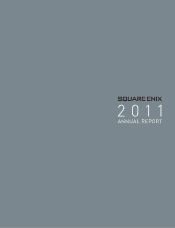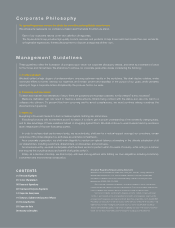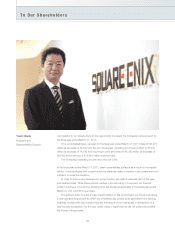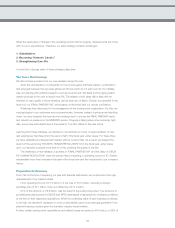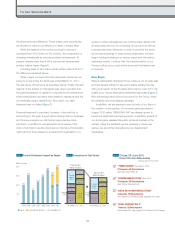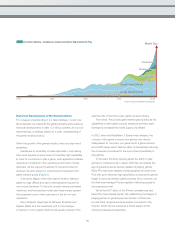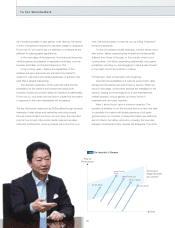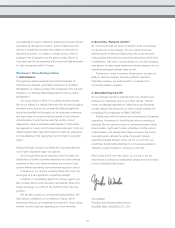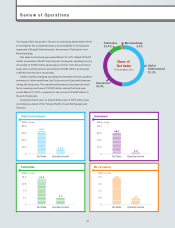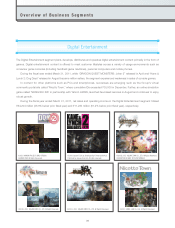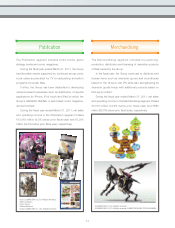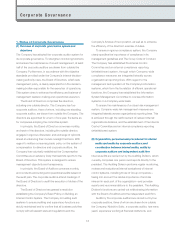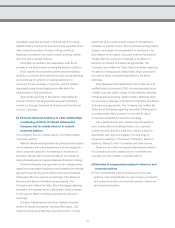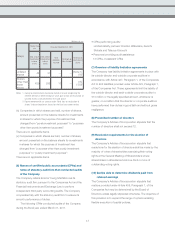Square Enix 2011 Annual Report Download - page 9
Download and view the complete annual report
Please find page 9 of the 2011 Square Enix annual report below. You can navigate through the pages in the report by either clicking on the pages listed below, or by using the keyword search tool below to find specific information within the annual report.
quintessential innovator’s dilemma. Sustaining innovation will be
surpassed by disruptive innovation, and the dilemma is that
winners in sustaining innovation are unable to comprehend
disruptive innovation, or unable to change course, which is
precisely what is happening to the game industry (Figure 5).
I can even say that cloud gaming will be the most ideal alternative
for high-end gaming within 10 years.
The Group’s Three Strategic Pillars
1. Globalization
If the gaming industry expands as investment barriers for
customers are lowered, geographic expansion is inevitable.
Globalization is a basic premise of all companies in the industry.
Therefore, our strategy differentiates itself on how we define
globalization.
Our group does not think of one global, abstract market.
We do not believe it is realistic that every title will sell throughout
the entire world, and we do not seek this. Market segments
should be identified not by region but by consumer preference,
and each piece of content must be pursued on its individual
characteristics. It might be the case that certain content
designed for Japan’s extremely small segment of core users
also appeals to French and Chinese students as well. I think our
market segmentation approach based on customer preference
is more scalable in that deployment is not limited to a specific
region.
Having this basic concept, our distribution channels take firm
root in each respective region we operate.
Even though there are no national borders for taste, the
distribution of content is entirely dependent on local business
practices. In fact, even network services are rooted in local
cultural differences making them extremely regional in nature.
Furthermore, our Group’s recruiting bases that cover the
world give us a very significant competitive strength.
In addition to considering talent from various regions, we
also consider factors such as personnel systems, taxes, and
foreign exchange, to construct the optimal human resource
portfolio.
We are also focusing on entering emerging markets. We
have almost completed our foundations in Japan, North
America and Europe, and established a foothold in China. Going
forward, we will be actively expanding into more territories.
2. Becoming “Network Centric”
As I have mentioned, we have to transform both our business
model and our content design. The two critical points are
embracing the continuous relationships with customers and
having pricing determined by customers according to their level
of satisfaction. We need to pursue these not only with emerging
new genres, but also as we implement network aspects into our
traditional packaged software titles as well.
Furthermore, under a common infrastructure, we gain the
ability to become network, and even platform operators.
Ultimately, however, we must transform ourselves into a
community platform operator.
3. Strengthening Own-IPs
As our business domain is entertainment, the ultimate bond
between our customers and us is content brands. This will
remain unchanged regardless of infrastructure and business
models utilized. We will put all our efforts toward creating 10+
compelling IPs comparable to FINAL FANTASY.
Furthermore, with the network as the centerpiece of business
operations, the amount of flexibility held when converting a
particular title into various content or services becomes critical.
How a creator might want to alter a title later in its life-cycle is
unpredictable in the development stage. However, the current
copyright system defines the rights of copyright holders
regarding changes allowed. Thus, without our own-IPs, we
would face fundamental obstacles in our business expansion.
Therefore, we are focused on holding our own-IPs.
After a year which may have given you concern, we are
determined to achieve our established targets and look forward
to your continuing loyal support.
Yoichi Wada
President and Representative Director
SQUARE ENIX HOLDINGS CO., LTD.
07

